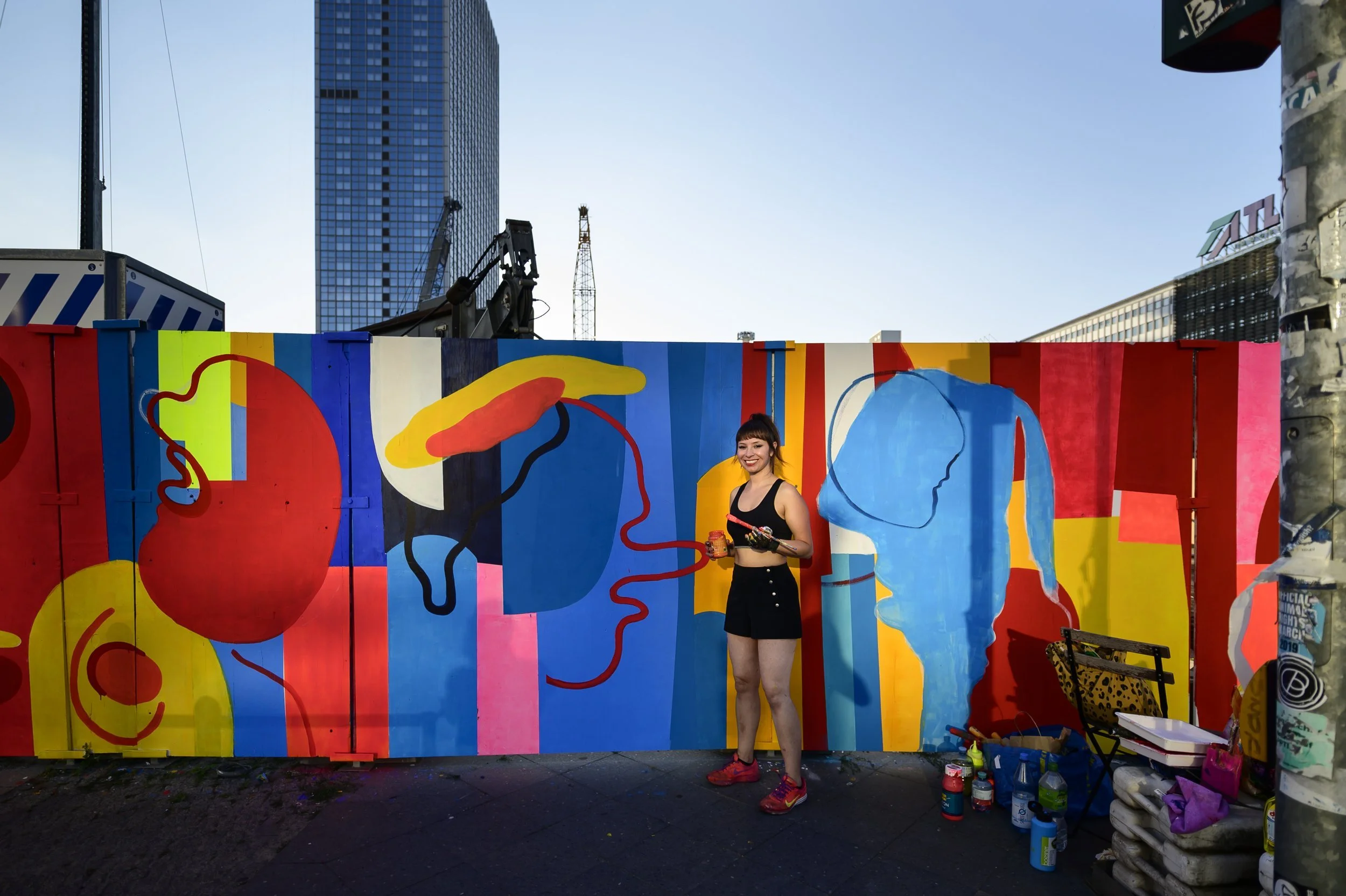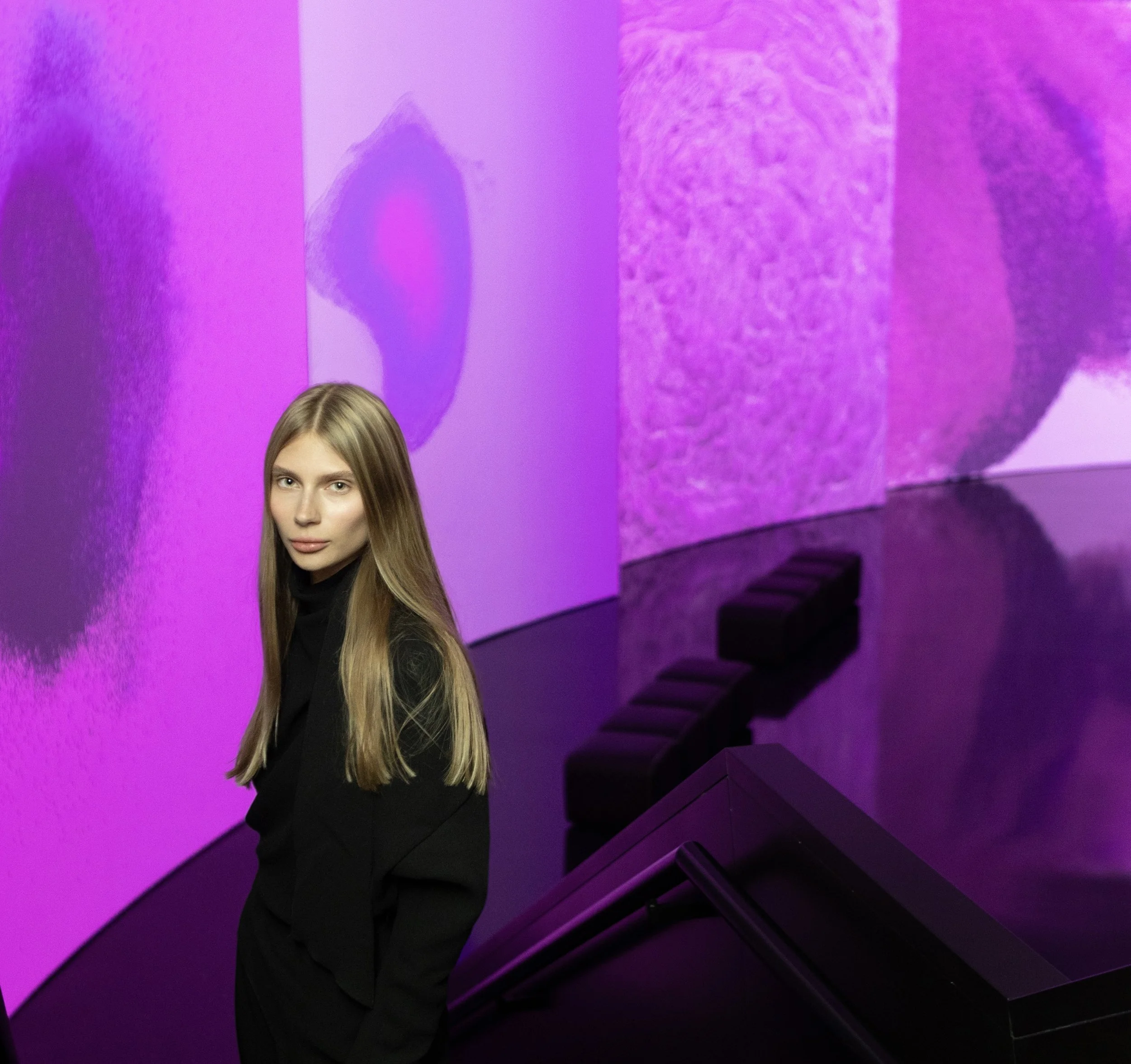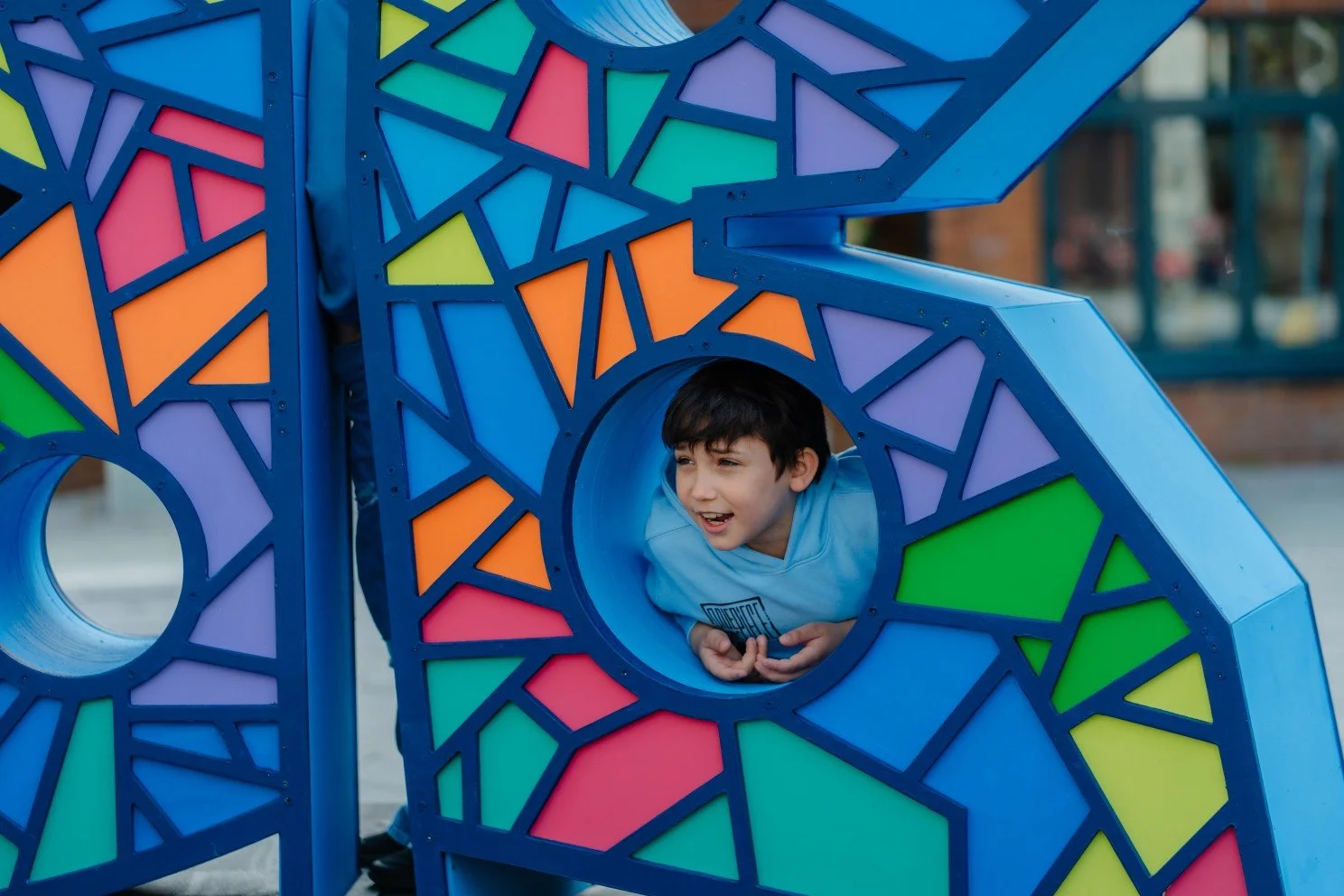INTERVIEW | Carolina Amaya
10 Questions with Carolina Amaya
Al-Tiba9 Art Magazine ISSUE13 | Featured Artist
Carolina Amaya (1981) is a contemporary artist residing in Berlin. Originally from Bogotá, Colombia, Amaya decided to relocate to Berlin in 2016, where she has since established a successful art practice. Working from her own studio, Amaya takes part in both national and international projects and exhibitions.
Carolina Amaya explores the concept of eroticism through the lenses of pleasure, consent, self-love, fears, and sensuality. Her work aims to provoke introspection and evoke emotions through a range of media, including large-scale installations, a variety of hairy objects, solid colors and extremely black lines, big-size drawings, sculptures, paintings, objects with light, and even photography - with her own body as the main object of the image. Imbuing her pieces with rich symbolism, Amaya's unique artistic voice inspires viewers to engage with their inner selves and explore the depths of their sensuality and desires.
Carolina Amaya has an extensive exhibition history in Berlin, showcasing her work in notable galleries such as Zwitschermaschine Galerie (2018), Lite Haus Gallery (2019), FoYou (2019-2022), Z22 (2021), and Game Over NFT Museum Berlin (2022). In addition, she has participated in several collective exhibitions at prestigious venues, including KaDeWe Berlin, Oberpollinger Munich, and Alsterhaus Hamburg (2021). Beyond her gallery exhibitions, Amaya has also created several urban interventions in cities such as Berlin, Munich, Hamburg, and her hometown of Bogotá. In 2016, she was the first Colombian artist to become a member of VBK (Verein Berliner Künstler).
Amaya's artistic training includes studying graphic design and visual arts in Bogotá, completing postgraduate studies in Morphology in Buenos Aires, and taking various courses in erotica and politics. In 2016, she furthered her artistic development by undertaking a residency at the Berlin Art Institute in Berlin.
In addition to her artistic pursuits, Carolina Amaya also shares her insights and experiences as a speaker at various events, corporations, and universities. Her speaking topics cover a wide range of subjects, including the inspiration, creative process, and meaning behind her artwork, her journey as an artist, personal development, healing, self-love, and spirituality. She also discusses how to turn emotions such as fear, shame, and guilt into positive and empowering forces.
www.carolinaamaya.com | @caroamaya.art
Carolina Amaya - Portrait
Primary Landscapes (acrylic on wood, 17x2,50 m, 2021)
Curated by : @_street_art_berlin_ | Photos by @cathrin_bach
ARTIST STATEMENT
Amaya's work is a dialogue between eroticism and human behavior stimulated through color and the excessive use of black and hair. Eroticism is a quality that all human beings possess and with which we can create a new relationship with our bodies. Eroticism is not just about sex. It is about our own sensuality, reconnected with our own existence. It is the gesture of how nature is represented as a whole. Her work is connected with the spirit of nature, uniting the physical body in a deeply human sense, not limited to gender in her works. Within this erotic message, Amaya uses hair as the main tool of her work in many manifestations. Hair is a unique structure: it is flexible enough and strong enough. She suffers from alopecia, and she became obsessed with the subject. Likewise, her work has been channeling and accepting this pathophysiological aspect, and inspiring and educating those who suffer from it. She uses different techniques of artistic expression, such as painting, installation, drawing, objects, digital art, and urban intervention. Often exaggerated, maximalist, and challenging, her means of expression mainly use an excess of color and stimulating shapes.
Natives of happiness, Installation, mixed media, paper, neon, textile, wood, 45 m2, 2021 © Carolina Amaya
Get your limited edition copy now
INTERVIEW
First, tell us a little about your background and studies. What kind of education or training helped you develop your approach to art?
Like all human beings, I started at three years old to paint and draw in a very natural way. The big difference is that my family encouraged me to continue with the artistic path in my life. My father was the one who taught me to paint. We painted seascapes and landscapes together. At 15 years old, I had a small tumor in my head that made me tremble with fear, but the large art collection of books that my father bought me saved my life. Learning from the futurists, "Breakfast in Fur" by Oppenheim, the Fauves, an infinite array of characters coming from Egon Schiele, and "Seated Bather on the Beach" by Picasso were pieces and artists that touched my heart and transformed my life. I knew in my heart that sooner or later, I would become an artist.
I went on to study graphic design, mainly because my family advised me not to study art. They used to believe that art would never let you pay the rent. Now they see that's definitely not true at all!! Finally, I studied graphic design and Visual arts career in Colombia, Bogota, where I grew up.
I completed my postgraduate studies in Morphology at UBA University in Argentina. Additionally, I have earned several diplomas in diverse fields, including eroticism in art, political art, activism, Indigenous heritage, and popular art. One of the most enriching experiences of my life was the privilege of being a disciple of Master Armando Villegas, a highly respected Peruvian/Colombian artist. Through his unwavering discipline, strong convictions, and deep passion for art, I gained invaluable insights into the world of art.
You are a versatile multidisciplinary artist, but what is your preferred medium of choice, the one you will always come back to?
Definitely! I love to work with, in, and out of the three-dimensional space. It's so rich and so delicious to work thinking about light, materials, depth, time, and one of the most important things for me: the reaction, interaction, destruction, and transformation of my work. It's a beautiful experience. And it is temporary, exactly like life is. Most of my murals or interactive installations are made to last anywhere between 6 months to 3 years. I don't destroy my work, I transform myself. I learn by doing, transforming, and understanding that nothing lasts forever, and I love painting or drawing because it gives me the possibility to last forever. I have alopecia, which is a huge topic in my work also, so I try to work with hair as a material and as a topic. Hair is also politics!
ñamiñami © Carolina Amaya
As you mention in your statement, you work with several different mediums, such as painting, installation, drawing, objects, digital art, and urban intervention. What do these different mediums have in common, in your opinion? And how do they influence each other in your practice?
Imagine your life having the same taste each and every day. Wearing the same color, doing exactly the same thing every day. I feel thankful to god and life for having the possibility to choose! How many people in this world don't have any possibility of choosing anything? And how many people in the past have died so that we can choose now? For me, drawing is a thinking process, painting is how I connect to the spirit and nature, working with light is like having sex, digital art has no limits, and urban art lets me get closer to people. So for me, each way of creating is a magic way of how I decide to experience this life.
Your work uses bold colors and "maximalist and challenging means of expression," as you stated. What messages do you want to convey? What would you like the public to get away from your work?
Sometimes people feel uncomfortable with my work. I get it, and it's fine. I don't make art to please anyone. How many times are we not comfortable with our own lives? I want people to feel challenged, uncomfortable, and comfortable stepping into my world. I want them to experience how through respect, love, forgiveness, and moving on, we can change something in our lives and, therefore, in society. My work is about self-love, pleasure, and consent. Sometimes it is an act of forgiveness and a lot of fun and sarcasm." Better to feel confused and uncomfortable than to be sure and in a comfort zone. That's the clue to give space to yourself to change.
Zimmerfreheit, Interactive mixed media installation, Aerosol, acrylic, fabrics, furniture, light, 50 m2, 2018
Zwitschermaschine Galerie, Berlin / Germany
Curated by Denis Leo Hegic / Michelle Houston
pic by @michailjahnphotography
© Carolina Amaya
Zimmerfreheit, Interactive mixed media installation 2018 © Carolina Amaya
You also mention eroticism as one of the focuses of your work. How does it influence your work? And how do you visually translate it into your pieces?
Yes. For me, eroticism is enjoying your body through pleasure and self-love. Eroticism is a quality or a characteristic that we all human beings may have so that we can create a better relationship with our bodies and existence. After so many toxic relationships, wanting to get married and have children, I discovered that all the happiness that I needed was inside of myself. Berlin gave me the possibility to understand that I had to get to know my fears and invite them for dinner, get to know them, and work with them, not against them; sometimes in the past, I was trying to push my fears away, and that's not how it works in order to find your freedom and happiness in this life.
For me, it's art and activism, the way to confront the world to change it. We can't be afraid to be seen to stand for something bold and generous. But to do that, we need first o confront ourselves. This is the interesting and challenging part. You need to want to change.
Once I understood and reflected through the years about this experience, I decided to be bolder in my message and just bring this freedom to the surface, because in the erotic world, there is nothing to be ashamed of; the world of erotism and self-love is a LIFETIME experience through senses, sensuality, pleasure, love, respect, vulnerability, tenderness, forgiveness, relaxation, admiration, consent, hugs, is far away from sex, which is the normal meaning that is still existing in our minds.
I was born in a very catholic society, full of shame, pain for admiring the naked body, full of violence against women, a misogynistic, macho society; of course, Colombia is changing a lot! Slowly this information is coming into our conscious, but we need more effort and more attention to this. What Art gives you is the potential to change!
Your style is unique and very recognizable. How did you develop it? And how did it change over the years?
Oh! That's beautiful that you feel it and see it! Only by doing, by trying, by being super disciplined and full of convictions, by getting to know who I am, and by choosing the things that really deeply make me happy. In the beginning, I had a lot of "constructive critics" like: "Your work looks cheap.", "Your work looks like the Berlin party of the 90s because of the colors.", "You have to change.", "Oh, these colors are too much!" - Well, thanks to these people, I made myself stronger.
I love to study, research, and then break the rules. Just do it with my heart. If, as an artist, you look for perfection, the game is over. I just enjoy and struggle with every new project that is coming. And I love it. My days are all different, I'm super organized, but I am learning to go with the flow. All the things I thought were mistakes were totally necessary to move forward and find a way that is still and will be forever in the process until I die.
On that note, are there other mediums or techniques you would like to experiment with?
Yes. Right now, I'm working with eco-friendly materials. It's a new world for me, especially because the colors I use are very difficult to find with components that will not damage the planet. But I'm on the way, trying new things out, like using fewer spray cans, less contaminating materials, and producing less in general.
We artists must be more responsible with the materials that we use. We have to force the big companies to produce and find ways to be less polluting.
Reborn, Chunky charcoal on paper, 500x150 cm, 2020 © Carolina Amaya
Intrusiv - Carolina Amaya in Collaboration with @Thomasrusch, Photography, 59x42 cm, 2022 © Carolina Amaya
Let's talk about the future. What are you working on now, and what are your plans for the future? Anything exciting you can tell us about?
I'm developing my first artist book, which will be more like a piece of art where I tell the world exactly what eroticism is about, so I'm excited about it. I started with the book one year ago, and it is still in process. I also started to work with Thomas Rusch, a German photographer with whom we are developing all the pictures for this book, and we are really happy about it. I also began with a new project where you have to be present to be part of the art piece - you will not buy a piece; you will buy the experience. Still in process. I will start a new huge drawing with dimensions of 3,50 m x 7,80 m made out of chunky charcoal. And I just moved into my own new studio in the heart of Lichtenberg Berlin, so I'm really happy.
What do you hope to accomplish this year, both in terms of career goals and personal life?
First of all, to enjoy life more. I tend to be a workaholic, so I'm learning to do nothing, enjoy a simple sunny day, have a coffee, and read more Jerry Saltz books. I will definitely continue with my personal projects, like the book, creating more installations in the new big studio, and having more guests passing by there!
Finally, any shows, galleries, or publications where our readers can find your work?
Yes, a group exhibition in Munich is coming in June, the launch of the book in Bogotá by November, and the new art/experience in my studio is also coming. Every day something new pops up!
Dear artists, skills are not enough. The main reflection here is: why and what do you want to impact/transform in the world/your world?


























